Author: info@discoverdairy.com
What Happens When a Calf is Born?
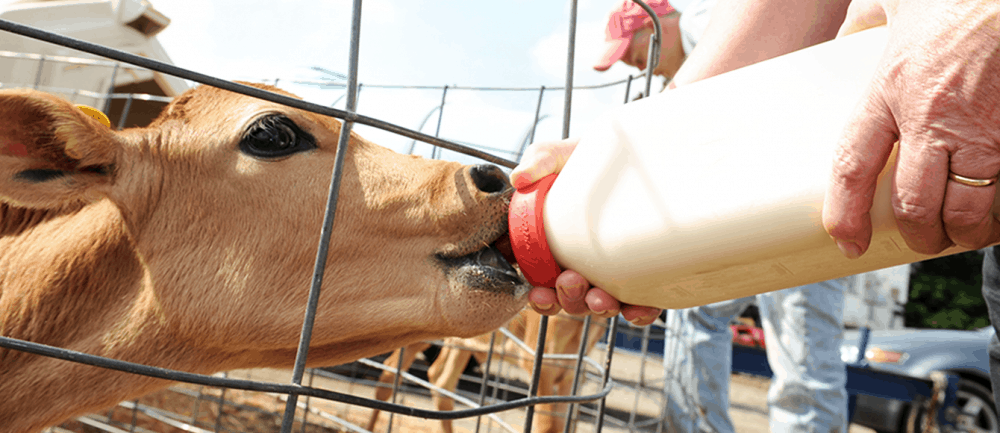
As you get ready for your calf announcement on October 15, it’s not too early to start introducing the world of dairy farming to your students! Here are a few videos and resources to help your class learn how calves are born and how they are cared for from their first day of life.
Age group? These calf-focused resources are ideal for all ages.
- Live Birth Video: To see what a birth is typically like for cows, watch this video from The Calving Corner. From 5:06:44 to 6:10, you can watch the cow go into labor and deliver her calf – and even watch the newborn calf walk for the first time. You could ask your students this discussion question to get the conversation started: How much do calves weigh when they are born? (Typically, 50-100 pounds)
- What Happens When a Calf Is Born? Have you ever wondered what happens when a calf is born? What do they look like? How big are they? Where do they live? Farmers go to great lengths to make sure that their cows and calves are healthy and well cared for. This article shares more about the birth process on the farm.
- Calf Care 101 Video: How do dairy farmers take care of their calves so they can grow to be productive members of the herd? In this 15-minute video, Meadow Spring Farm in Pennsylvania introduces you to some of the calves on their farm and some of their calf care best practices.
- Veterinarian Describes Calf Care: Dr. Mark Hardesty and Dr. Amy Benham share how calves are cared for and where they live in their first few months of life. Watch the four-minute video.
Virtual Farm Tours For Every Age Group This October
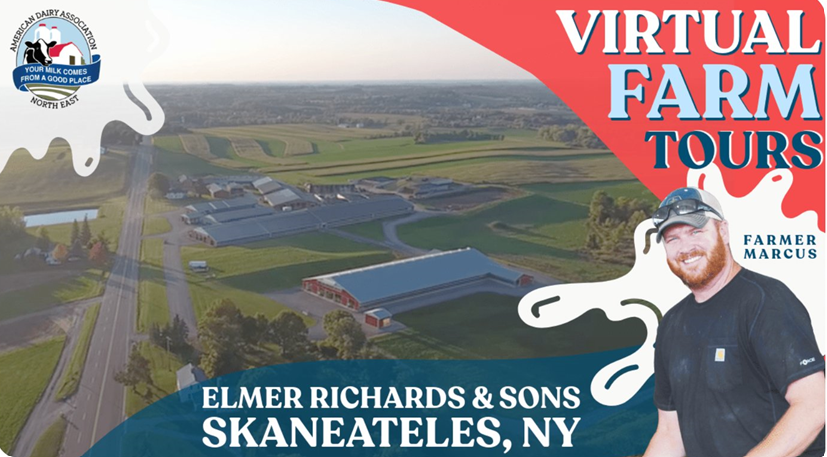
This October, American Dairy Association North East (ADANE) has two virtual farm tours planned for students of all ages! These are a great opportunity to introduce your students to dairy farming and what they’ll be experiencing through the year-long Adopt a Cow Program. Recordings of the tours are made available after the live events from ADANE
Register at the links below for one tour, or many! You will be emailed your custom link to join. Each tour is unique and LIVE. If you can’t join ADANE live, you will always be given a link to the recording on YouTube.
Grab your device of choice the day of the tour and join live. You can use a Zoom link, Facebook Live link, or YouTube link.
If you have questions about the farm tours, contact ADANE directly by emailing Kelsey O’Shea koshea@milk4u.org
Elmer Richards & Sons Virtual Tour
In this virtual tour brought to you by American Dairy Association North East, Farmer Marcus from Elmer Richards & Sons will explore three primary areas of the farm: where the calves live, where the cows live, and where the cows are milked. There will be check-in questions after each stop to engage students.
Access additional resources including lesson plans, vocabulary sheets, and all of the past tours!
Date: Thursday, October 31
Time: 10:00 a.m. ET
Length: 60 Minutes
Location: New York
Questions: Click here to learn more.
Age group? This farm tour is ideal for Pre K – 5th grade.
Deep Dive Virtual Tour
This is a “Deep Dive” tour of Elmer Richards & Sons, featuring specialists along with the farmer such as veterinarians, nutritionists, or environmental scientists. Students will get a closer look at how farms use technology and experts to provide the highest care for their animals and land. Check-in questions after each stop will engage students. Additional resources including lesson plans, vocabulary sheets, and past tours available here!
Date: Thursday, October 31
Time: 11:15 a.m. ET
Length: 60 Minutes
Location: New York
Questions: Click here to learn more.
Age group? This farm tour is ideal for grades 6-12.
Celebrate National Farmer’s Day on October 12
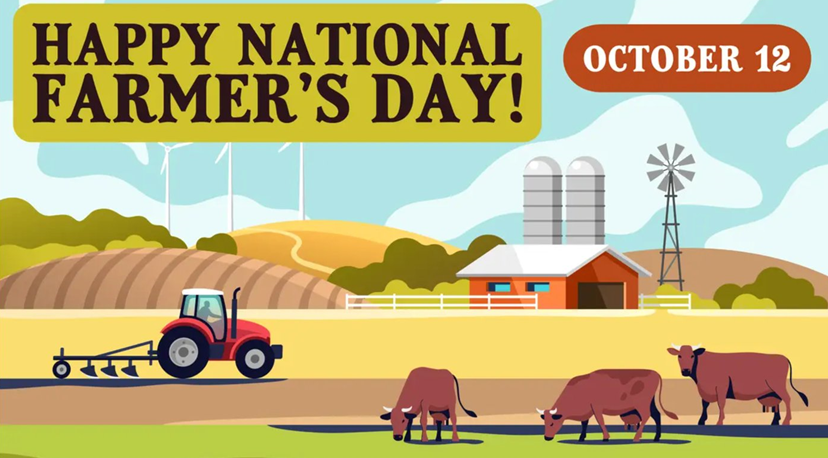
Did you know National Farmer’s Day is happening this week on October 12? Here are two creative ways to celebrate!
- Chef Meets Farm Special Video
We celebrate our hardworking dairy farmers not just on National Farmer’s Day, but each and every day of the year!
The Chef Meets Farm special features Emmy award-winning culinary producer and chef, Anthony Contrino, and farmer Nate Chittenden of Dutch Hollow Farm. What happens when a city chef travels to a farm to cook outside of his element? Watch to find out!
Age group? This video is open to all classrooms but it is ideal for middle school students.
- Write a message to your host farmer. You’ll be finding out who your host farm is in only two days on October 8! Once you do, your students can celebrate National Farmer’s Day by using our Contact Your Farmer tool to send a personalized message to your host farm. The tool allows you to mail handwritten letters/drawings or send an e-message to the farmers. *Note: Our host farms love receiving mail, but they may not have time to respond. Please know that they appreciate all of the fan mail!
Suggested messages: 1) A thank-you message for being your host farm 2) A few things students are excited to learn 3) An appreciative message about how farmers spend so much time caring for their land and animals.
Age group? This tool is open to everyone but is ideal for elementary and middle school students.
Dairy Fun Fact
Did you know that newborn calves start “moo-ing” shortly after birth? Within a few hours they will be walking around and find their voice!
Share this fact with your students as you introduce your adopted calf to them this school year.

Homemade Butter in a Cup

This BUTTER IN A CUP would be an easy recipe to make in the classroom and send home with students for them to share with family in making fall recipes and desserts.
Ingredients:
- 2 cups heavy whipping cream (cold)
- 1 oz plastic cups (with lids)
Preparation:
- Pour It: Pour 2 tablespoons of heavy cream into each portion cup. Place the lid on each cup, and distribute to students.
- Shake It: Shake the container until butter forms a soft lump. Continue to shake until buttermilk separates out of the lump and the container contains a solid lump of butter and liquid buttermilk. The process should take 3 to 5 minutes.
- Strain It: To strain, pour off or drink the buttermilk, leaving only the solid butter. You can save the buttermilk with future uses, like baking!
Serve It: optional: Remove the lump of butter and wrap it in plastic wrap. Refrigerate until you are ready to serve.
Create a Gender Guessing Activity
While you wait for your announcement about your adopted calf, many teachers have planned creative gender prediction and guessing game activities with their students. Encourage your students to cast votes or use sticky notes to visually display their predictions (boy or girl) on the board. Take a look at how a few teachers have done this!
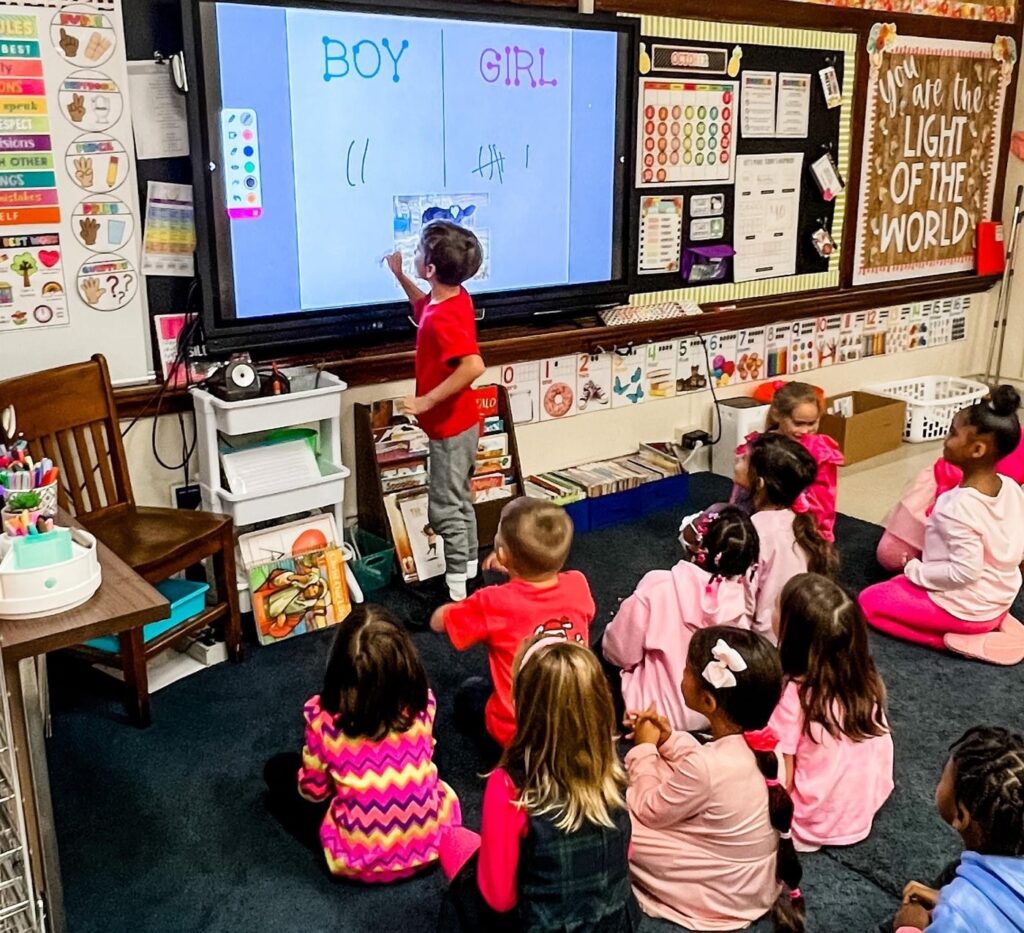
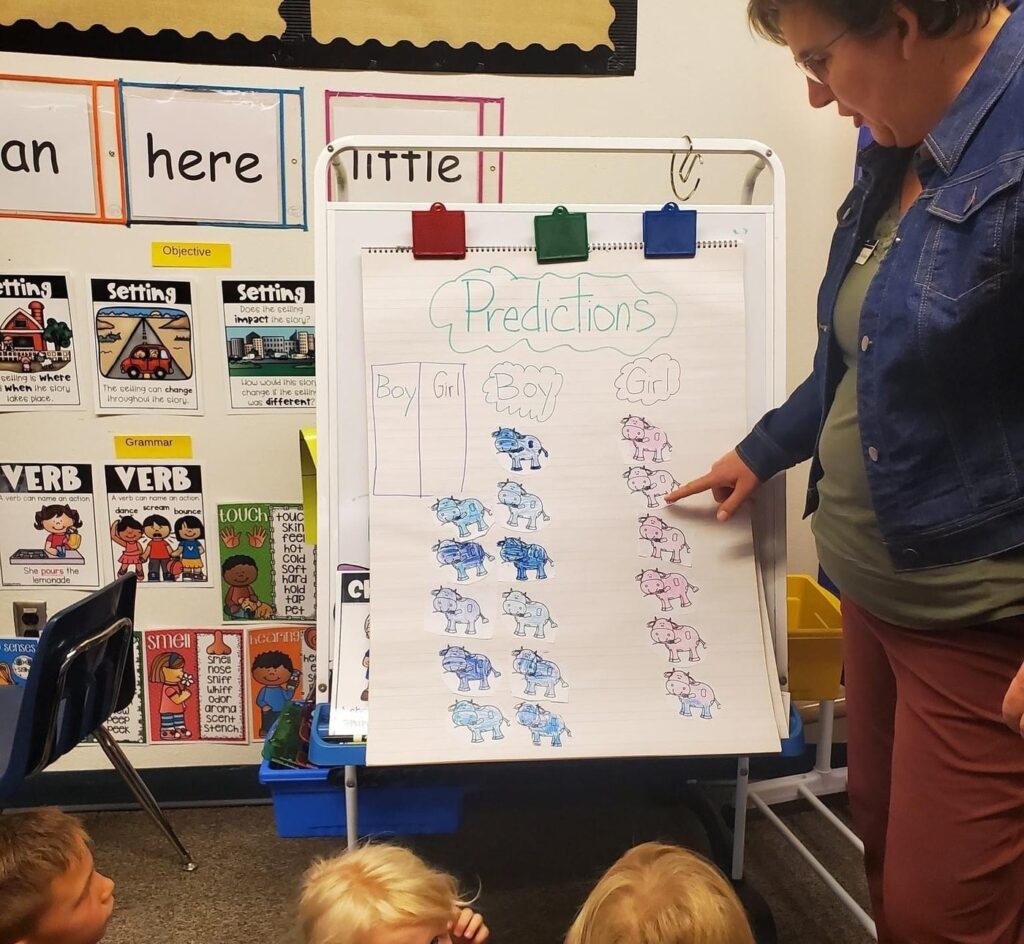
Elementary and Middle School Students Tour U.S. Dairy Farms Through Field Trip Grants
A Total of 69 Grants Were Awarded to Classrooms Who Planned Field Trips to Dairy Farms
A group of 69 elementary and middle school teachers from a total of 22 states, including Pennsylvania, provided their students with hands-on learning experiences at local dairy farms this spring. The teachers, who are enrolled in the Dairy Excellence Foundation’s Discover Dairy program, received dairy farm field trip grants through the Dairy Excellence Foundation, PA Dairymen’s Association, and Dairy Farmers of Wisconsin. The grants, which amounted to more than $30,000, allowed more than 2,900 students to tour dairy farms in their community and talk firsthand with dairy farmers and their families.
During the farm tours, students discovered how farmers care for their cows, conserve their natural resources, and produce nutritious dairy products. Teachers also used the farm tour field trip as an opportunity to build connections to their educational curriculum and local community.
“These dairy farm field trips give students the opportunity to get on the farm and expand on what they’ve learned through their Discover Dairy lessons and activities. Nothing is more memorable than receiving an up-close look at a dairy operation, especially for those students who have never seen one before,” said Brittany Snyder, Dairy Education Program Manager at the Dairy Excellence Foundation. “Congratulations to these teachers for receiving grants that could help them plan hands-on learning experiences on local farms.”
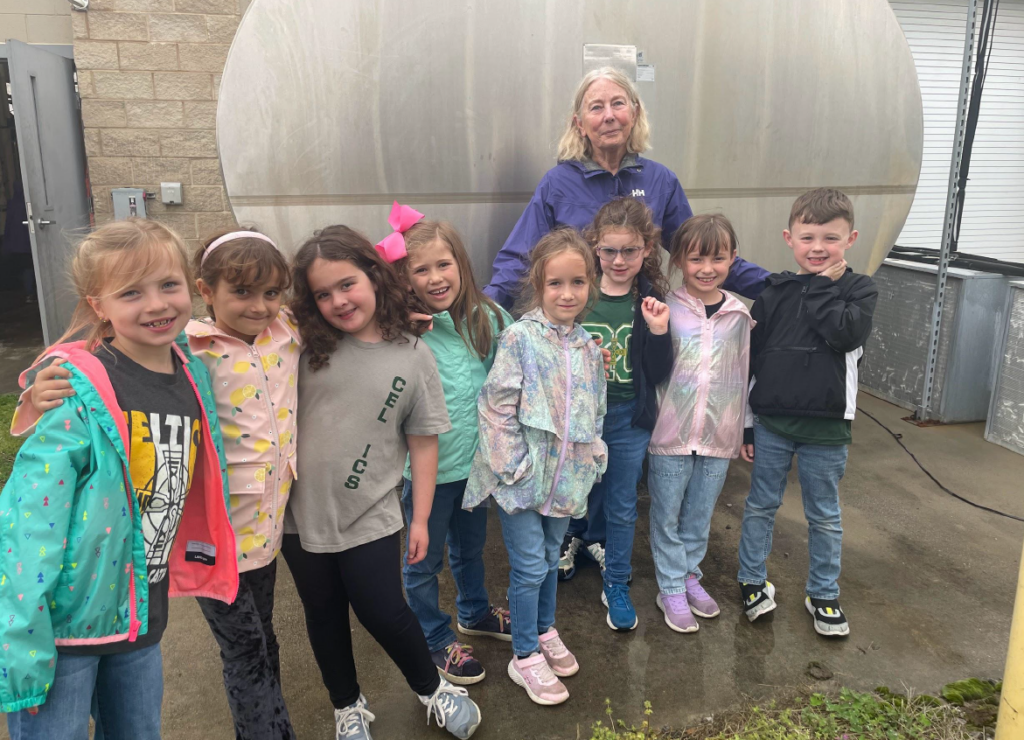
Funds from the dairy farm field trip grants can assist teachers in paying for busing, farm tours, lunch, or dairy treats. Any classroom currently enrolled in the Discover Dairy program is eligible to apply, with several grants designated specifically for Pennsylvania and Wisconsin classrooms.
The farm tour field trip grants allowed classrooms to make meaningful connections within their communities. Through these hands-on learning experiences, students gained an appreciation for:
- How important dairy farming is to their community. “The generous grant from Discover Dairy enabled 25 first-grade students to visit a working dairy farm where they learned about different types of cows, what cows eat, and their favorite dairy products. The students were also able to meet undergraduate students majoring in dairy science who work at the farm. The trip really highlighted to students how important dairy farming is to our community. It reinforced the care and process used to get milk from cows to our tables at home. I cannot wait to participate in the Discover Dairy program again this year. I appreciated how organized and well thought out each email, activity, and update was.” –Sarah, a first-grade teacher from Virginia and farm tour field trip grant recipient
- The work that goes into dairy products on grocery store shelves. “The grant provided a wonderful opportunity for my pre-k students and their families. It gave us the opportunity to see the calves and young animals on the farm, make butter, create a fun cow craft, and take a wagon ride to the dairy barn and observe cows being milked. Students and their families had a lot of great questions and learned about what it takes to run a dairy farm. We all left with a greater appreciation for the hard work and dedication that goes into putting dairy products onto grocery store shelves.” –Martha, a pre-kindergarten teacher from Maine and farm tour field trip grant recipient
- Making their own food. “We visited a working dairy farm in Pennsylvania, Walmoore Holsteins. I bought a read-aloud story [about dairy farms], and we made our own butter. We loved all of the opportunities this grant afforded us.” –Tanya, a fourth-grade teacher from Pennsylvania and farm tour field trip grant recipient
- Interacting with animals. “My pre-kindergarten students traveled to a local dairy farm in Texas. When we pulled into the driveway, our students began clapping on the bus. It was the sweetest gesture of gratitude expressed by four and five-year-old students. Our students got to interact with baby calves and each student was given the opportunity to milk a cow. We are very grateful for the grant that enabled us to fund this field trip.” –Doedee, a pre-kindergarten teacher from Texas and farm tour field trip grant recipient
- Setting foot on a farm. “My third graders loved going to a dairy farm in Illinois! For many of the students, it was their first time setting foot on a farm. Each child had the opportunity to pet a cow, feed a calf, feed a goat, and milk a cow. They loved this experience.” –Elly, an elementary school teacher from Illinois and farm tour field trip grant recipient
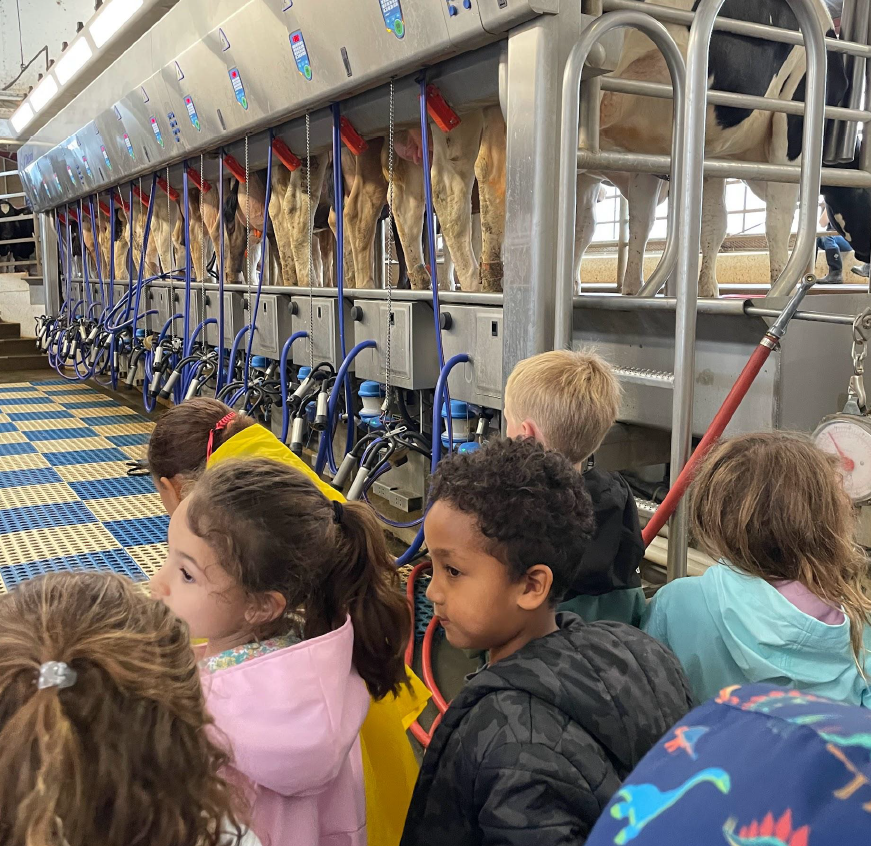
Discover Dairy, managed by the Dairy Excellence Foundation, is an engaging, interactive, multi-level educational series that shows upper elementary and middle school students where milk comes from and how dairy farmers contribute to our communities. Applications for upcoming dairy farm field trip grants will be available on November 1, 2024 for teachers who are enrolled in the Discover Dairy program. Learn more about the program and grant opportunities at www.discoverdairy.com/take-trip-dairy-farm. For more information, contact Brittany Snyder at bsnyder@centerfordairyexcellence.org or call 717-346-0849.
The Discover Dairy program also includes the popular Adopt a Cow program, which impacts more than one million students each school year and connects classrooms directly to a calf from a progressive dairy operation. Teachers who enroll in the Adopt a Cow program will receive an introductory update this fall with details about their calf. Classrooms will receive monthly updates, including suggestions on components of the Discover Dairy curriculum that teachers can incorporate into their virtual or in-person lesson plans. The sign-up period closes on September 15, 2024. To enroll in the Adopt a Cow program, visit www.discoverdairy.com/adopt or contact the Dairy Excellence Foundation at 717-346-0849 for more information.
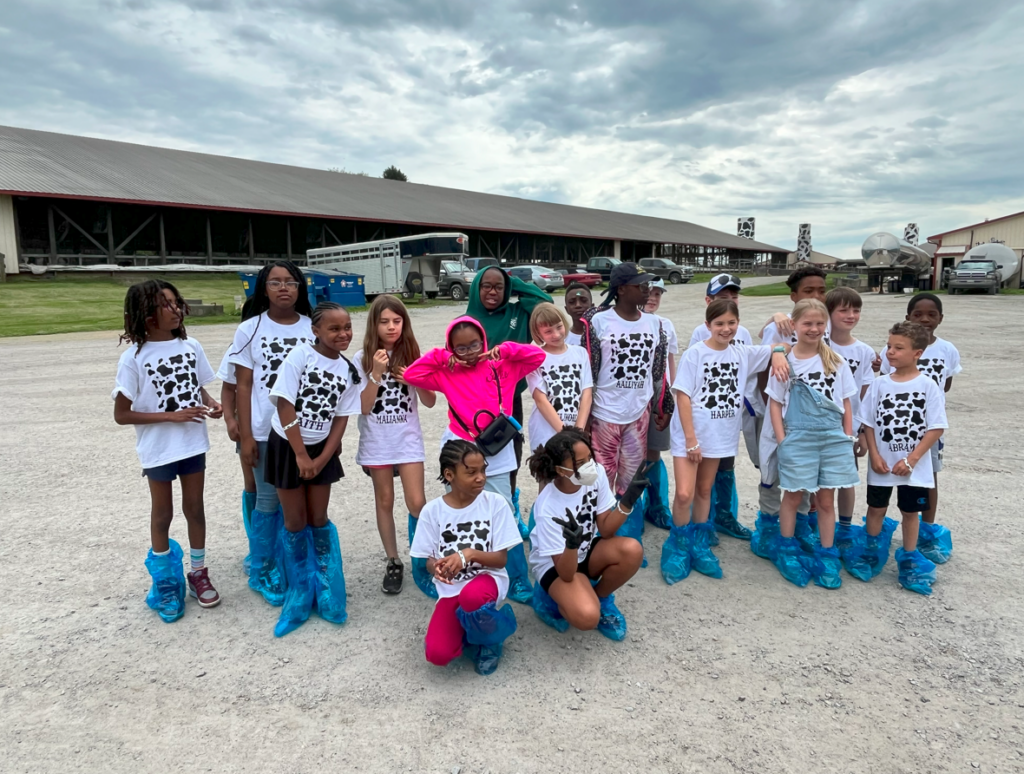
Discover Dairy is an educational series managed by the Center for Dairy Excellence Foundation of Pennsylvania in partnership with American Dairy Association Northeast, American Dairy Association Indiana, Midwest Dairy, The Dairy Alliance, Dairy Farmers of Wisconsin, Dairy Management West, Dairy West, New England Dairy, Dairy Farmers of Washington, American Dairy Association Mideast, Dairy Council of Florida, United Dairy Industry of Michigan, Maine Dairy and Nutrition Council, and Oregon Dairy Council.
Maine Teacher Makes Fascinating Connections Between Local Ecosystems and Dairy Farming
Dairy farmers rely on a wide range of skills on a daily basis, but especially math and science. Lacey Todd, a fifth-grade science teacher at Mountain Valley Middle School in Maine, has been weaving dairy farming and agriculture into her science and ecosystems curriculum through Discover Dairy’s Adopt a Cow program.
“I was at a workshop and the Adopt a Cow program came up in conversation. I thought it sounded pretty cool to do with my fifth-graders, because I teach science at the middle school level. We’re the lowest grade here, so I have pets in my classroom and things like that,” Lacey shared. “This seemed like it would be a nice tie-in to some of the work we do with some of the other animals and with the ecosystems.”
Many of her students live in poverty and aren’t familiar with dairy farms, but Lacey says agriculture careers are a very viable possibility.
“It’s a rural area. We have a high poverty rate, and we’re a title one school. We’re surrounded by a lot of places that were formerly farmland,” she said. “This is a new thing for a lot of the kids, but it’s not out of the realm of possibilities for professions they could end up choosing.”
After signing up for the Adopt a Cow program and being paired with a calf from a dairy farm, Lacey and her students were excited to find out that their calf lived only about 40 minutes away from them. This helped them realize the local connections agriculture has in their community.
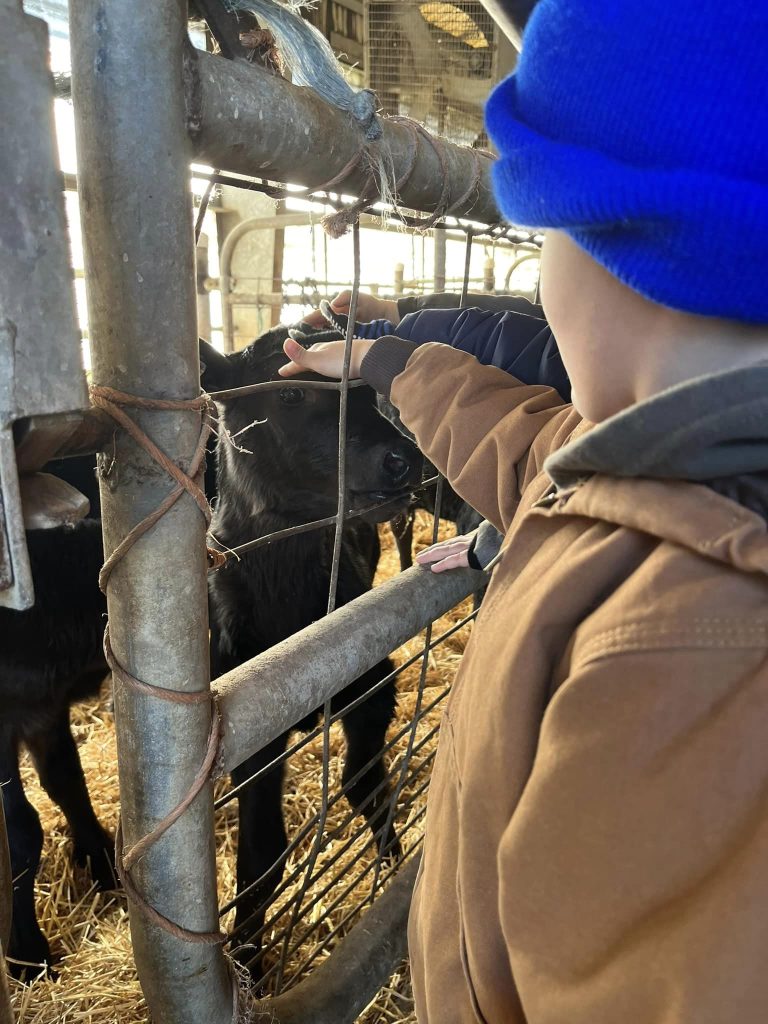
“When they found out the dairy farm was not only in our state, but only about 40 minutes away and right on the way to the area they would go shopping, they were so excited. That first day was so exciting when they found out which farm we had been paired with and when we saw those initial pictures of our calf,” she added.
With regular photo updates, videos, dairy-themed activities, and lessons that help teachers make STEM connections, Lacey has been able to connect the Adopt a Cow program directly to her curriculum and units. For example, her students used the growth chart that is provided through the program to develop their math and data collection skills by predicting how big their calf would grow.
“They’ve enjoyed the growth chart. We had a lot of really interesting predictions. We had a wall with our calf’s actual height and weight along with the updates as they came in. We compared that with the kids’ predictions, so they were kind of collecting data as it came through. That was important,” Lacey said.
Within her ecosystems unit, Lacey says they typically look at native species, including animals, plants, and fungi. She helps students consider how they are connected within food webs and how humans fit into the local ecosystem.
“At that point, we begin talking about food sources. Which things are naturally growing and living here in Maine, and which do we specifically plant, raise or grow? Cows are brought into that conversation,” Lacey explained. “They start making connections between the agriculture component of what actually needs to happen for a cow to be sustained for a lifetime. What are they eating? How much water are they drinking? They think about how much water a cow consumes over its lifetime, not just in what it drinks but also in the feed that is prepared for it. They’re developing this appreciation for every glass of milk they drink, including how much water has gone into it.”
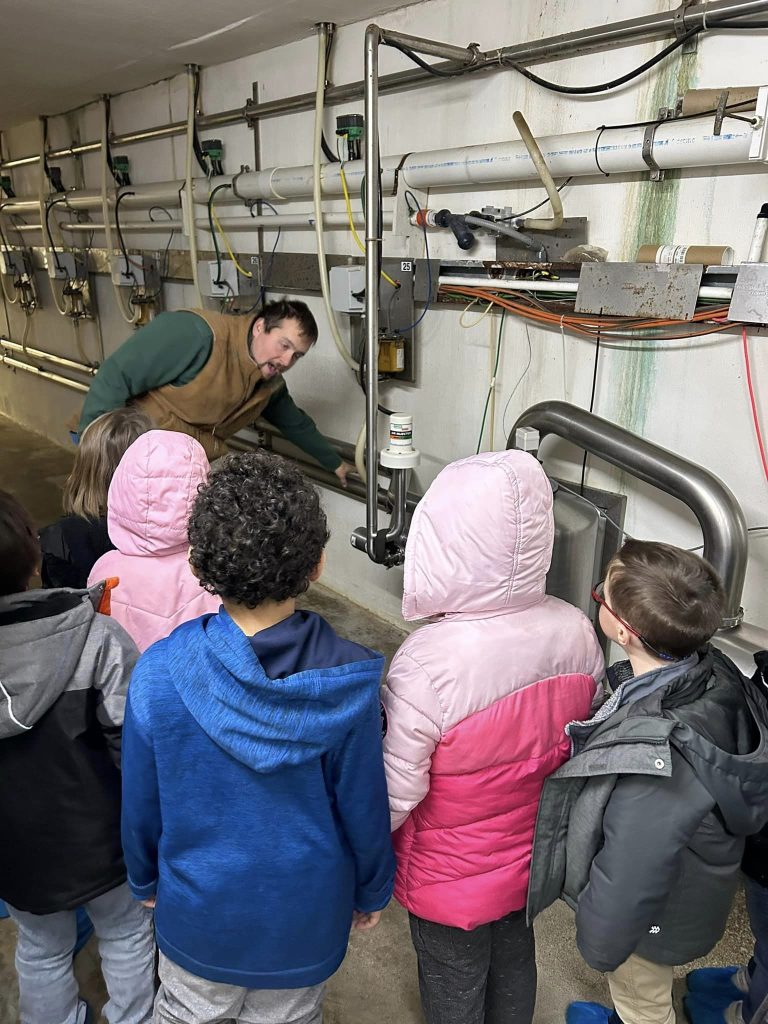
Lacey even used some of Discover Dairy’s animal health lessons, which are available at no cost through the program, to help share what a calf needs in order to grow and be healthy. One of the bonus activities provided through the Adopt a Cow/Discover Dairy program was an activity for making ice cream, which connected to some of her science curriculum.
“That activity was queued up when we worked on mixtures, solutions and chemical changes. We tied it into that,” Lacey added. “I’ve been picking away at some of the Discover Dairy lessons, and I hope to do more of them this year in depth.”
As a Discover Dairy participant, Lacey was able to apply for a Farm Tour Field Trip Grant. Her classroom was awarded the grant, which allowed them to tour a dairy farm in their community and see the operation in action. Lacey says these experiences have helped her students realize that agriculture could be a potential career option in the future and is an important part of the fabric of their state.
“Agriculture is really specific and special to our state, and I think it has kind of been lost over the last 20 to 50 years. I wanted them to learn that agriculture is an industry that still exists and is something students can get involved with,” Lacey said. “Having that knowledge about these career opportunities, developing the appreciation for where their food comes from, and seeing how technology has found its way into this profession, those pieces are all very important to students.”
Click here to sign up for the free program by September 15.
Discover Dairy is an educational series managed by the Center for Dairy Excellence Foundation of Pennsylvania in partnership with American Dairy Association Northeast, American Dairy Association Indiana, Midwest Dairy, The Dairy Alliance, Dairy Farmers of Wisconsin, Dairy Management West, Dairy West, New England Dairy, Dairy Farmers of Washington, American Dairy Association Mideast, Dairy Council of Florida, United Dairy Industry of Michigan, Maine Dairy and Nutrition Council, and Oregon Dairy Council.
Oregon School Cafeteria Adopts a Cow to Get Students Excited About Drinking Milk
What does it look like when an entire school cafeteria adopts a calf from a dairy farm? For Lynne Shore, Nutrition Services Director at Willamina School District in Oregon, she made this a reality for the 800 students (K-12) her cafeteria serves. After planning a farmer’s markets for students a year earlier, Lynn and her team decided to take it a step further by participating in Discover Dairy’s “Adopt a Cow” program.
“I don’t think kids have much experience with dairy farms other than just driving by them. We have a farm-to-school education grant, and last year we did a farmer’s market where the kids could actually buy food from a farmer and take it home,” Lynne shared. “We had the Dairy Princess Ambassador come and she actually brought a calf. That’s kind of where the connection started, so we have been following that connection along with the Adopt a Cow program. It has been really eye-opening, especially for kids who don’t see dairy farms every day.”
With the cafeteria being a central point between all the schools in the Oregon school district, Lynne enjoys adding bursts of education and fun into the students’ lunch experience. After adopting a calf through the program, she received regular photos, video updates, lesson ideas and other activities throughout the year to share with students when they visited the cafeteria.
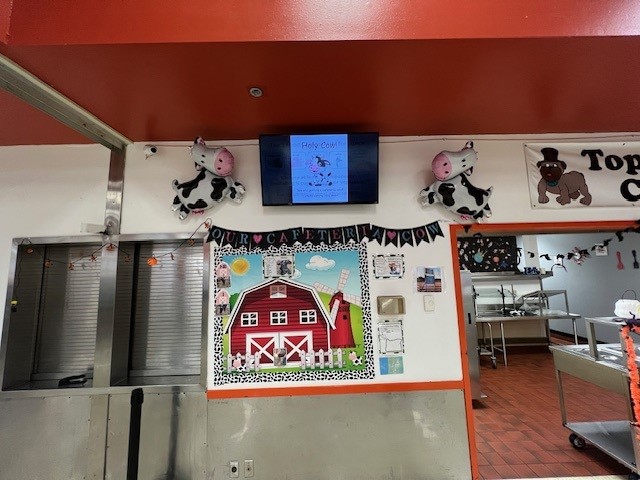
“I’m always looking for educational opportunities and this looked like a good one. It kind of went with our mission of providing milk for the kids,” she added. “I’m always looking for things that are touch-and-go education, because we really don’t have the kids in our cafeteria for very long and they have to eat while they’re here.”
Lynne created a bulletin board to share updates about their adopted calf Mabel, including photos and a growth chart. She also led a gender reveal activity where students used stickers to vote if the calf was going to be a boy or a girl. After receiving their calf announcement, she sent each classroom a box to open with a pink cow inside. On Valentine’s Day, she customized the valentine templates sent through the program and added a “Love from your cafeteria calf” message to them.
The farm tour videos provided through the Adopt a Cow program have been especially valuable for the cafeteria setting. Lynne will loop the videos on a monitor in the cafeteria to give students a virtual tour of a working dairy farm.
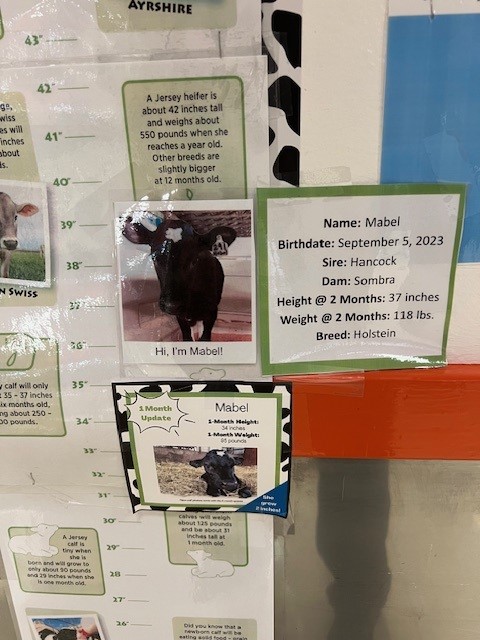
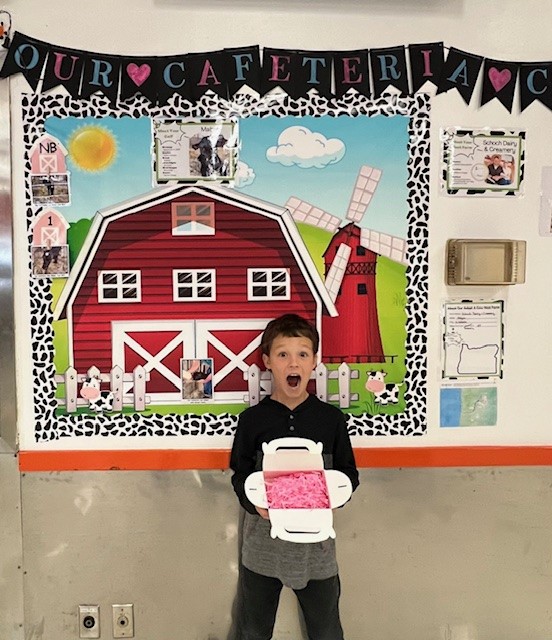
“They love it. One day they wanted more videos, so I put up the dairy farm tour. I’ve had kids ask if the milk they were drinking came from our dairy cow. I had another student who had no idea milk even came from a cow. They are asking good questions,” Lynne explained.
At a broader level, the Adopt a Cow program is helping the cafeteria staff make important nutrition-based learning moments with students – who now understand exactly where their milk comes from and have a personal connection with the farmers and animals that produce it.
“I think the program is really encouraging the kids to drink milk. It’s always important for kids to know where their food comes from, but especially milk and foods they see every day. It’s really important to see where it comes from and the process. It has been really fun for the kids,” Lynne shared.
Click here to sign up for the free program by September 15.
Discover Dairy is an educational series managed by the Center for Dairy Excellence Foundation of Pennsylvania in partnership with American Dairy Association Northeast, American Dairy Association Indiana, Midwest Dairy, The Dairy Alliance, Dairy Farmers of Wisconsin, Dairy Management West, Dairy West, New England Dairy, Dairy Farmers of Washington, American Dairy Association Mideast, Dairy Council of Florida, United Dairy Industry of Michigan, Maine Dairy and Nutrition Council, and Oregon Dairy Council.
Make a Cow Habitat
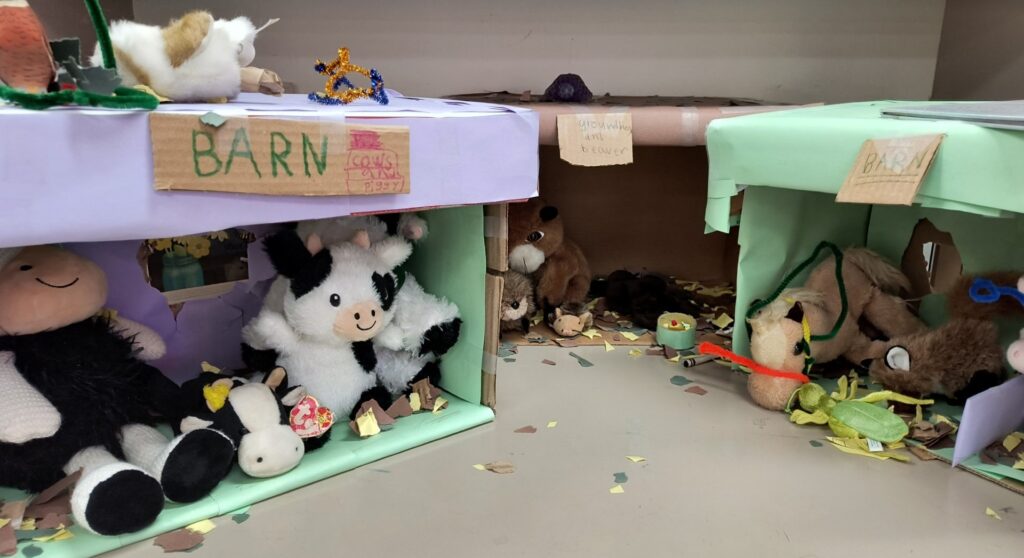
Make a Cow Habitat
Melanie, a third-grade teacher in Pennsylvania, is helping bring the Adopt a Cow program to life for her students through hands-on activities. The students have used their imagination and creativity to create their own barnyard habitats. Each habitat needed to provide the essential things to care for the animals like shelter, food, and water. What a fun way to review the Adopt A Cow program!